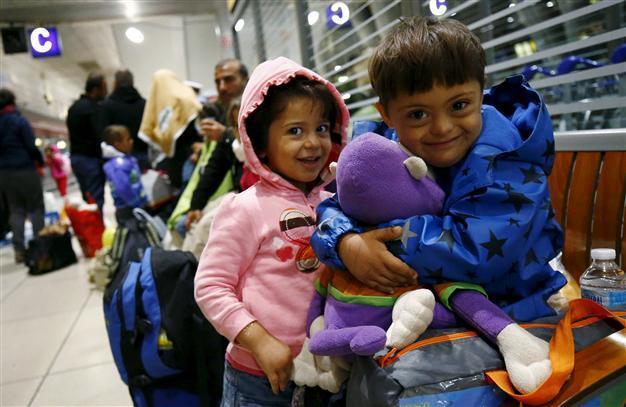Eastern European countries reject migrant quotas
PRAGUE - Agence France-Presse

Two Syrian children laugh as they cuddle a stuffed toy given by wellwishers after they arrived with a train from Budapest's Keleti station at the railway station of the airport in Frankfurt, Germany, early morning September 6, 2015. Reuters Photo
Eastern European countries rejected migrant quotas on Sept. 11, exposing a deep rift on the continent over how to respond to the crisis as new footage raised further questions about Hungary's treatment of floods of refugees.Pressing his Czech, Hungarian, Polish and Slovakian counterparts in Prague, Germany's foreign minister warned that the influx of hundreds of thousands of migrants could be "the biggest challenge for the EU in its history."
"If we are united in describing the situation as such, we should be united that such a challenge is not manageable for a single country," Frank-Walter Steinmeier said, calling for "European solidarity."
But Steinmeier's appeal to agree to European Commission proposals unveiled on Wednesday to share around 160,000 migrants among the 28-nation bloc fell on deaf ears.
"We're convinced that as countries we should keep control over the number of those we are able to accept," said Czech Foreign Minister Lubomir Zaoralek after the meeting.
The UN's refugee agency meanwhile welcomed the EU plan -- which Berlin has said should go further still -- to distribute refugees, but said more was needed to relieve pressure on frontline states.
"The proposed relocation scheme for 160,000 refugees from Greece, Italy and Hungary would go a long way to address the crisis," UNHCR spokesman William Spindler told reporters, warning though that "our initial estimates indicate even higher needs."
Underscoring the scale of the challenge, a record 7,600 migrants entered Macedonia in just 12 hours overnight, according to a UN official.
And Steinmeier said Germany expects some 40,000 migrants to arrive this weekend.
With the bloc continuing to squabble, EU president Donald Tusk said he would call a leaders' summit if a European justice and home affairs ministers' meeting in Brussels on Monday failed to yield a breakthrough.
"After contacts that I had with member states in the last few days, I feel more hopeful today that we are closer to finding a solution based on consensus and genuine solidarity," Tusk said.
But "without such a decision, I will have to call an emergency meeting of the European Council," he said.
EU lawmakers have called for an international conference on migration bringing together the United States, United Nations and Arab countries.
Facing criticism that his government has been too slow to help, US President Barack Obama pledged to admit at least 10,000 Syrian refugees over a year starting October 1.
Spokesman Josh Earnest said Obama had ordered staff to "scale up" the number after over 62,000 Americans signed a petition calling on Washington to take in more people.
The apparent failure of Steinmeier's mission came as record numbers of people, 70 percent of them fleeing Syria according to the UNHCR, entered both Macedonia and Hungary.
In addition to the 7,600 entering Macedonia overnight from Greece, Hungarian police said 3,601 crossed the border on Thursday.
From Hungary, the migrants attempt to reach western European countries, principally Germany and Sweden, via Austria, which on Thursday suspended rail services to Hungary.
The response of Hungary, which has seen some 175,000 migrants enter this year, has been to lay a razor wire barrier and for almost 4,000 soldiers to begin erecting a fence four metres (13 feet) high with the help of prisoners from a nearby jail.
Draconian new laws entering into effect on Tuesday will allow Hungary to jail migrants and mooted legislation will see the army deployed and soldiers and police given wide-ranging new powers.
Further concerns about Hungary were raised by video footage showing migrants inside a holding camp being fed in the words of one volunteer "like animals in a pen", with women and children caught in a scrum.
"It was inhumane and it really speaks for these people that they didn't fight over the food despite being clearly very hungry," said Austrian volunteer Michaela Spritzendorfer, who filmed the scenes.
Hungarian Prime Minister Viktor Orban reiterated Friday that his country was merely applying European rules in seeking to register the new arrivals, pinning the blame on fellow EU member Greece for letting migrants leave and travel north.
"Just because Greece is not keeping to the common (Schengen) agreement does not authorise Hungary to give up on the Schengen rules as well," Orban said in Budapest.
Meanwhile, a Hungarian camerawoman who caused global outrage after being caught on film tripping and kicking refugees, including children, as they fled police apologised and said she had "panicked".
"I'm not a heartless, child-kicking racist camera-person," said Petra Laszlo, who was sacked by N1TV, an Internet-based television station close to Hungary's far-right Jobbik party, after the footage went viral.
Laszlo said in a letter to a newspaper that she did not "deserve either the political witch hunt that is going on against me, or the smears or the many death threats".
Meanwhile on the Greek island of Lesbos the boats kept arriving, with hundreds making a gruelling 50-60 kilometre (30-40 miles) walk from their landing place to the main town to be registered.
"We have been walking for four hours. There is no bus, no taxi, no water, no anything," said Mohammed Yassin al-Jahabra, a 23-year-old English literature student.
Thousands of people have been forced to camp on the streets in squalid conditions, and there were repeated clashes as riot police struggled to control huge crowds pressing forward to board ferries.
















